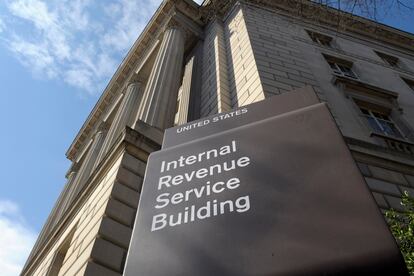IRS will pause taking claims for pandemic-era tax credit due to an influx of fraudulent claims
The tax credit, called the Employee Retention Credit, was designed help small businesses keep paying their employees during the height of the pandemic if they were fully or partly suspended from operating

The Internal Revenue Service is pausing accepting claims for a pandemic-era tax credit until 2024 due to rising concerns that an influx of applications are fraudulent.
The tax credit, called the Employee Retention Credit, was designed help small businesses keep paying their employees during the height of the pandemic if they were fully or partly suspended from operating. The credit ended on Oct. 1, 2021, but businesses could still apply retroactively by filing an amended payroll tax return.
A growing number of questionable claims are coming from small businesses who may or may not be aware that they aren’t eligible. Because of its complex eligibility rules, the credit quickly became a magnet for scammers that targeted small businesses, offering them help to apply for the ERC for a fee — even if it wasn’t clear that they qualified. The credit isn’t offered to individuals, for example.
“The IRS is increasingly alarmed about honest small business owners being scammed by unscrupulous actors, and we could no longer tolerate growing evidence of questionable claims pouring in,” IRS Commissioner Danny Werfel said. “The further we get from the pandemic, the further we see the good intentions of this important program abused.”
The IRS has received 3.6 million claims for the credit over the course of the program. It began increasing scrutiny of the claims in July. It said Thursday hundreds of criminal cases have been started and thousands of ERC claims have been referred for audit.
Because of the increased scrutiny, there will be a longer wait time for claims already submitted, from 90 days to 180 days, and longer if the claim needs a review or audit. And the IRS is adding a way for small businesses to withdraw their claim if they no longer think they’re eligible. About 600,000 claims are pending.
The government’s programs to help small businesses during the pandemic have long been a target for fraudsters. It’s suspected that $200 billion may have been stolen from two other pandemic-era programs, the Paycheck Protection and COVID-19 Economic Injury Disaster Loan programs.
Small business owners who may want to check whether they’re actually eligible for the credit can check resources on the IRS website including an eligibility checklist.
Sign up for our weekly newsletter to get more English-language news coverage from EL PAÍS USA Edition
Tu suscripción se está usando en otro dispositivo
¿Quieres añadir otro usuario a tu suscripción?
Si continúas leyendo en este dispositivo, no se podrá leer en el otro.
FlechaTu suscripción se está usando en otro dispositivo y solo puedes acceder a EL PAÍS desde un dispositivo a la vez.
Si quieres compartir tu cuenta, cambia tu suscripción a la modalidad Premium, así podrás añadir otro usuario. Cada uno accederá con su propia cuenta de email, lo que os permitirá personalizar vuestra experiencia en EL PAÍS.
¿Tienes una suscripción de empresa? Accede aquí para contratar más cuentas.
En el caso de no saber quién está usando tu cuenta, te recomendamos cambiar tu contraseña aquí.
Si decides continuar compartiendo tu cuenta, este mensaje se mostrará en tu dispositivo y en el de la otra persona que está usando tu cuenta de forma indefinida, afectando a tu experiencia de lectura. Puedes consultar aquí los términos y condiciones de la suscripción digital.








































